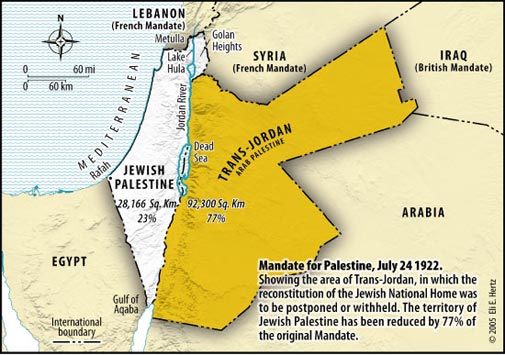President Bush will be bitterly disappointed if he is expecting a historic breakthrough in negotiations over the next twelve months between Israel and the Palestine Liberation Organisation (PLO).
The doublespeak and hype emanating from Annapolis about those ongoing negotiations needs to be understood in the context of the following key statement made by Israel’s Prime Minister - Ehud Olmert - in his speech at Annapolis:
“The negotiations will be based on previous agreements between us, U.N. Security Council Resolutions 242 and 338, the road map and the April 14, 2004 letter of President Bush to the Prime Minister of Israel.”
The reference by Ehud Olmert to “the April 14, 2004 letter” has scarcely rated a mention in the hundreds of Annapolis post mortems - yet understanding its significance and the role it will play in Israel’s conduct of future negotiations with the PLO is crucial.
Prime Minister Sharon explained that significance to Israel’s Parliament on 22 April 2004:
"Since the establishment of the State, we have not received such vast and staunch political support, as was expressed in the President's letter
In the letter, clear conditions are set out for the establishment of a Palestinian state. First and foremost, the Palestinian Authority carrying out its commitments as laid out in the Roadmap: cessation of violence, terror and incitement, dismantling terrorist organizations and implementing comprehensive reforms in the Palestinian Authority.
The letter includes: unequivocal American recognition of Israel's right to secure and protective borders, and as it appears: "defensible borders", American recognition of Israel's right to defend itself by itself anywhere and to preserve its strength of deterrence against any threat, and American recognition of Israel's right to defend itself against active terror and terrorist organizations anywhere, including in areas from which Israel will withdraw.
The United States also expressed its position on the most crucial topics for Israel,in discussions regarding a final status agreement:
(i) on the subject of the refugees, a clear and historic stand was expressed according to which there will be no return of refugees to Israel.
(ii) Likewise,there is American acknowledgement that in any final status agreement there will be no Israeli withdrawal to the '67 lines. This acknowledgement appears in two ways: understanding the facts determined by the large Israeli settlement blocs such as making it impossible to return to the '67 lines, and implementation of the concept of "defensible borders".
The United States believes that the large settlement blocs will remain under Israeli control in every arrangement. Negotiations regarding the final status agreement will take place between Israel and the Palestinians. However, if, during the negotiations disagreement on these subjects should arise, the United States will support Israel's stance and this will allow Israel to be in a better stand. This is an unprecedented accomplishment.”
This letter is obviously going to be a central pillar in Israel’s rejection of PLO demands that the PLO be given every square metre of the West Bank, that the 450000 Jews living there be uprooted and that millions of Arabs be allowed to go and live in Israel.
PLO Chairman, Mahmoud Abbas, is too weak to abandon these demands - first made by Yasser Arafat in 1974 - which have been parroted and trotted out by the Arab League ever since.
Six opportunities to create an Arab State between Israel and Jordan have been rejected or missed:
(i) When recommended by the Peel Commission in 1937
(ii) When offered by the United Nations in 1947
(iii) Between 1948 -1967 when the Arabs could have created such a State by the stroke of a pen whilst in total occupation and control of the West Bank and Gaza.
(iv) Between 1967 -1993 when the Arabs refused to negotiate with Israel after losing the West Bank and Gaza
(v) In 2000 when Israel’s offer was rejected and terrorism and violence was espoused by the PLO instead.
(vi) In 2005 when Israel unilaterally removed 8000 Jews living in Gaza and started a withdrawal from the West Bank.
Demographics and Realpolitik have now overtaken this mindless and senseless display of Arab intransigence.
There will be bi -weekly meetings between Olmert and Abbas - lots of “feel good” statements will be issued - and no doubt regular and intensive negotiations will be held between Israel, the PLO and US Secretary of State Condoleezza Rice - but to what purpose?
Unless Abbas is prepared to concede the heavily populated Jewish areas of the West Bank to Israel and abandon the claimed Arab right of return to Israel, these negotiations will become bogged down in the quicksand that marked the frenetic negotiating sessions prior to Annapolis.
Circuit breakers such as a land swap by Israel and token admission of an undetermined number of Arabs to Israel have been floated as possible ways for the PLO to change direction without loss of face. Given the extremely weak and vulnerable position of the PLO at this point of time and the knowledge that any such concessions will not bring an end to the conflict, Israel would indeed be gambling with the safety and security of its citizens if it agreed to any such demands.
Certainly President Bush’s letter does not oblige Israel to make any such concessions.
Despite the posturing and grandstanding at Annapolis, there will be no change in the cycle of nothingness that has existed since President Bush’s euphoric announcement of his “ two state vision” in 2002.
Fruitless negotiations over the next twelve months will see the President’s vision consigned to the shelves of his Presidential Library as a testament to six years of wasted diplomacy.
Paralysis has set in and become institutionalised for the next 12 months as a result of Annapolis - and nothing the President does or says will be capable of producing any discernible movement.
